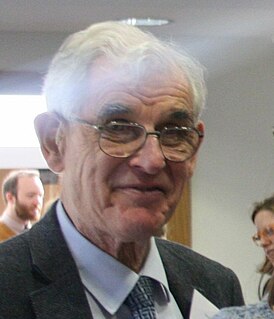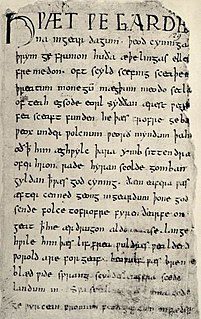Related Research Articles

Beowulf is an Old English epic poem in the tradition of Germanic heroic legend consisting of 3,182 alliterative lines. It is one of the most important and most often translated works of Old English literature. The date of composition is a matter of contention among scholars; the only certain dating is for the manuscript, which was produced between 975 and 1025. Scholars call the anonymous author the "Beowulf poet". The story is set in pagan Scandinavia in the 6th century. Beowulf, a hero of the Geats, comes to the aid of Hrothgar, the king of the Danes, whose mead hall in Heorot has been under attack by the monster Grendel. After Beowulf slays him, Grendel's mother attacks the hall and is then defeated. Victorious, Beowulf goes home to Geatland and becomes king of the Geats. Fifty years later, Beowulf defeats a dragon, but is mortally wounded in the battle. After his death, his attendants cremate his body and erect a tower on a headland in his memory.
Old English literature, or Anglo-Saxon literature, encompasses literature written in Old English, in Anglo-Saxon England from the 7th century to the decades after the Norman Conquest of 1066. According to Bede, the 7th century work Cædmon's Hymn is considered as the oldest surviving poem in English. Poetry written in the mid-12th century represents some of the latest post-Norman examples of Old English. For example, The Soul's Address to the Body found in Worcester Cathedral Library MS F. 174 contains only one word of possible Latinate origin, while also maintaining a corrupt alliterative meter and Old English grammar and syntax, albeit in a degenerative state. The Peterborough Chronicle can also be considered a late-period text, continuing into the 12th century. The strict adherence to the grammatical rules of Old English is largely inconsistent in 12th century work – as is evident in the works cited above – and by the 13th century the grammar and syntax of Old English had almost completely deteriorated, giving way to the much larger Middle English corpus of literature.

Cædmon is the earliest English poet whose name is known. A Northumbrian who cared for the animals at the double monastery of Streonæshalch during the abbacy of St. Hilda, he was originally ignorant of "the art of song" but learned to compose one night in the course of a dream, according to the 8th-century historian Bede. He later became a zealous monk and an accomplished and inspirational Christian poet.
Benjamin Thorpe was an English scholar of Anglo-Saxon literature.

A scop was a poet as represented in Old English poetry. The scop is the Old English counterpart of the Old Norse skald, with the important difference that "skald" was applied to historical persons, and scop is used, for the most part, to designate oral poets within Old English literature. Very little is known about scops, and their historical existence is questioned by some scholars.
The Old English poem Judith describes the beheading of Assyrian general Holofernes by Israelite Judith of Bethulia. It is found in the same manuscript as the heroic poem Beowulf, the Nowell Codex, dated ca. 975–1025. The Old English poem is one of many retellings of the Holofernes–Judith tale as it was found in the Book of Judith, still present in the Catholic and Orthodox Christian Bibles. Most notably, Ælfric of Eynsham, late 10th-century Anglo-Saxon abbot and writer, composed a homily of the tale.

The Blickling Homilies is the name given to a collection of anonymous homilies from Anglo-Saxon England. They are written in Old English, and were written down at some point before the end of the tenth century, making them one of the oldest collections of sermons to survive from medieval England, the other main witness being the Vercelli Book. Their name derives from Blickling Hall in Norfolk, which once housed them; the manuscript is now Princeton, Scheide Library, MS 71.
Michael Joseph Alexander is a British translator, poet, academic and broadcaster. He held the Berry Chair of English Literature at the University of St Andrews until his retirement in 2003. He is best known for his translations of Beowulf and other Anglo-Saxon poems into modern English verse.
"The Husband's Message" is an anonymous Old English poem, 53 lines long and found only on folio 123 of the Exeter Book. The poem is cast as the private address of an unknown first-person speaker to a wife, challenging the reader to discover the speaker's identity and the nature of the conversation, the mystery of which is enhanced by a burn-hole at the beginning of the poem.

Eric Gerald Stanley FBA was a British Anglo-Saxonist; he was Rawlinson and Bosworth Professor of Anglo-Saxon and Fellow of Pembroke College, Oxford, from 1977 to 1991 and was emeritus professor until his death.
Nicholas Howe (1953–2006) was an American scholar of Old English literature and culture, whose Migration and Mythmaking in Anglo-Saxon England (1989) was an important contribution to the study of Old English literature and historiography.
John D. Niles is an American scholar of medieval English literature best known for his work on Beowulf and the theory of oral literature.
Roy Liuzza is an American scholar of Old English literature. A professor at the University of Tennessee in Knoxville, Liuzza is the former editor of the Old English Newsletter. He has published a translation of Beowulf which was well-received and praised for its readability and correspondence with the original, besides scholarly monographs and articles, including many on translating and dating Beowulf.
Colin Robert Chase was an American academic. He was an associate professor of English at the University of Toronto, and known for his contributions to the studies of Old English and Anglo-Saxon literature. His most notable work, The Dating of Beowulf, was credited with upsetting the accepted orthodoxy of the dating of the Anglo-Saxon poem Beowulf, and leaving behind what was described in A Beowulf Handbook as "a cautious and necessary incertitude". Chase died of cancer in 1984, shortly before his promotion to full professor.
John Richard Clark Hall was a British scholar of Old English, and a barrister. In his professional life, Hall worked as a clerk at the Local Government Board in Whitehall. Admitted to Gray's Inn in 1881 and called to the bar in 1896, Hall became principal clerk two years later.

Beowulf: A New Verse Translation is a verse translation of the Old English epic poem Beowulf into the modern English language by Seamus Heaney. Translated throughout the late 1990s, it was published in 1999 by Farrar, Straus, and Giroux and won that year's Whitbread Book of the Year Award. It is dedicated in memory of Heaney's friend, the poet and translator Ted Hughes.
Hugh Magennis may be:
Leonard Neidorf is an American philologist who is Professor of English at Nanjing University. Neidorf specializes in the study of Old English and Middle English literature, and is a known authority on Beowulf.
Carol Braun Pasternack (1950–2020) was a professor of medieval English literature and language at the University of California, Santa Barbara (UCSB) from 1988 to 2013. She chaired the Medieval Studies department, and was also Dean of Summer Sessions at UCSB in 2011–2013.

The difficulty of translating Beowulf from its compact, metrical, alliterative form in a single surviving but damaged Old English manuscript into any modern language is considerable, matched by the large number of attempts to make the poem approachable, and the scholarly attention given to the problem.
References
- 1 2 "Hugh Magennis". Royal Irish Academy. Retrieved 6 April 2021.
- 1 2 "Hugh Magennis". Queen's University Belfast . Retrieved 6 April 2021.
- ↑ Magennis, Hugh; McWilliams, Stuart, eds. (2012). Saints and Scholars: New Perspectives on Anglo-Saxon Literature and Culture in Honour of Hugh Magennis. DS Brewer.
- ↑ "(Whole Issue of the Journal) Holy and Unholy Appetites in Anglo-Saxon England: a Collection of Studies in Honour of Hugh Magennis". English Studies. Taylor and Francis. 93 (5): 501–620 (collection of articles). 2012. Retrieved 6 April 2021.
